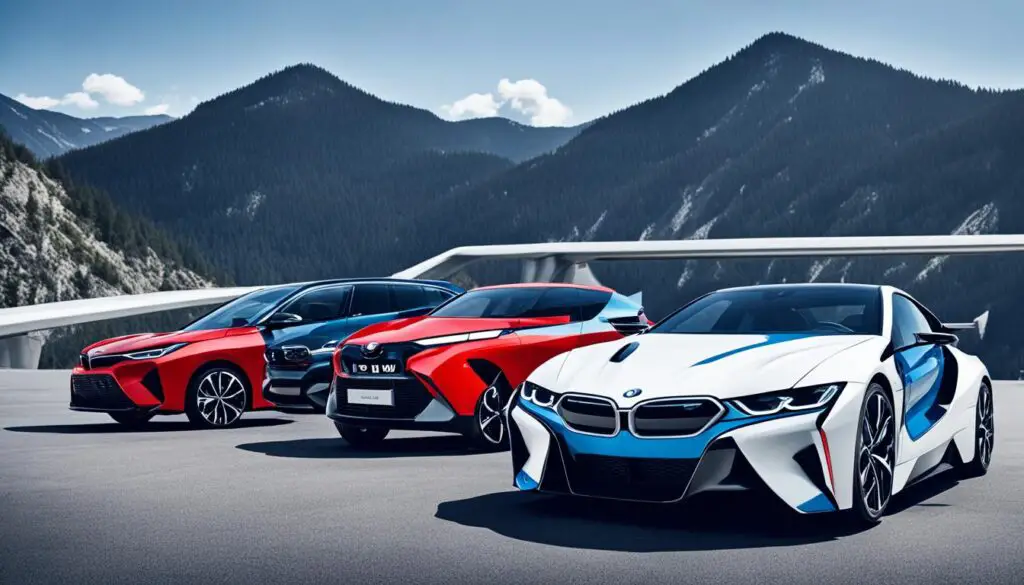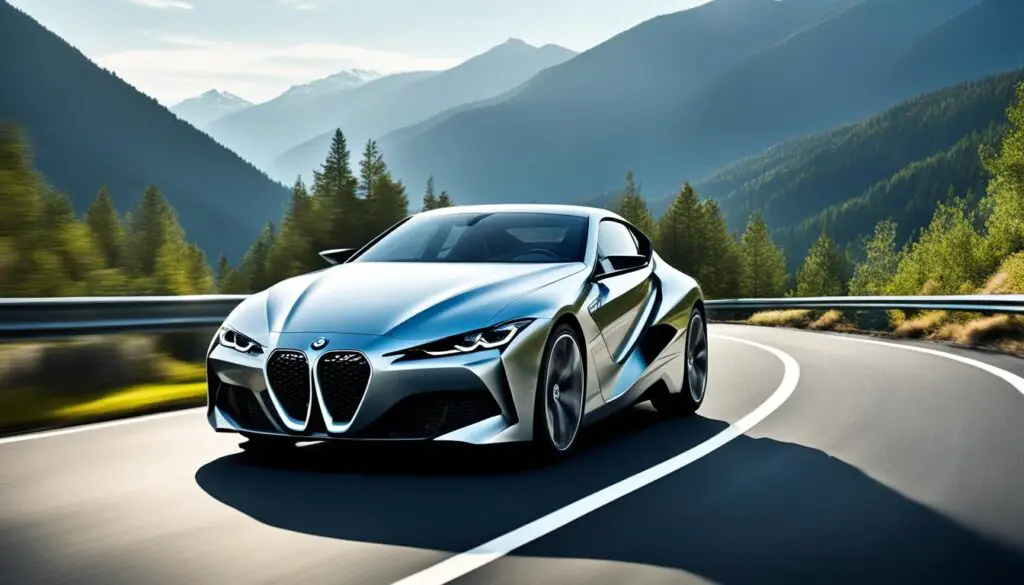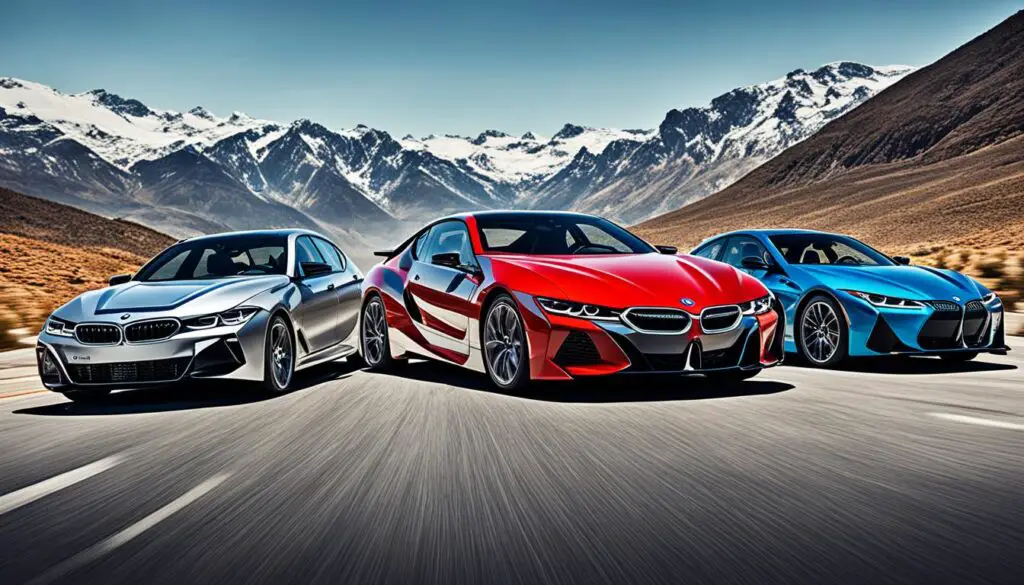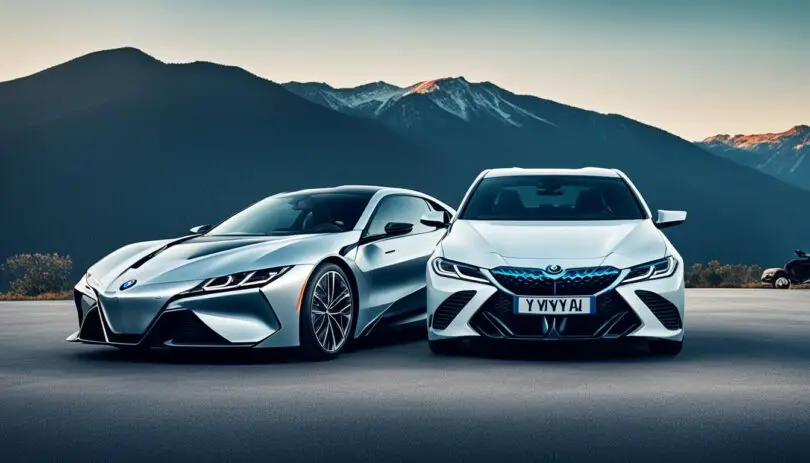Welcome to my article on BMW and Toyota’s partnership and technology sharing. In this piece, I will delve into the collaborative efforts between these two automotive giants, exploring how they join forces to develop cutting-edge technologies and enhance their competitive positions in the industry.
BMW and Toyota have come together to work on several projects, including the development of a new sports car. The partnership extends beyond this exciting venture and encompasses collaborations on fuel cell and hybrid engines, as well as lightweight materials. Both companies share a strategic vision for a sustainable future of mobility, and through their collaboration, they aim to achieve this goal.
By leveraging each other’s strengths and sharing resources, BMW and Toyota are pushing the boundaries of innovation and setting new standards in the automotive industry. Together, they strive to create vehicles that not only provide exceptional driving experiences but also contribute to a greener, more sustainable world.
Key Takeaways:
- BMW and Toyota have partnered to develop a new sports car and collaborate on fuel cell and hybrid engines.
- Both companies share a strategic vision for sustainable future mobility.
- Through their collaboration, BMW and Toyota aim to strengthen their competitive positions in the automotive industry.
- The partnership between BMW and Toyota represents a significant alliance in the automotive industry, addressing changing technologies and consumer preferences.
- Collaboration between major automakers is becoming more prevalent, allowing for shared costs and accelerated innovation.
BMW and Toyota Collaboration in Developing Next-Generation Technologies
In March 2012, BMW and Toyota entered into a strategic collaboration aimed at pushing the boundaries of innovation in the automotive industry. Through this partnership, the two companies have been working together to develop next-generation technologies that will shape the future of car manufacturing. From fuel cell systems to architecture and components for a future sports vehicle, BMW and Toyota are leveraging each other’s strengths to drive progress and sustainability.
One of the key areas of collaboration between BMW and Toyota is the research and development of next-generation lithium-ion battery cells. By joining forces, the companies are able to pool their resources and expertise, leading to more efficient and high-performance battery technology. This is crucial in the advancement of electric and hybrid vehicles, as it enables longer range and faster charging capabilities.
Additionally, BMW has been supplying diesel engines to Toyota since 2014 as part of the collaboration. This partnership allows Toyota to benefit from BMW’s expertise in diesel engine technology, enhancing the performance and efficiency of Toyota’s vehicles.
Another focus of the collaboration is on powertrain electrification. BMW and Toyota are working together to develop advanced electric powertrains that offer increased efficiency and performance. By sharing their knowledge and resources, they are able to accelerate the development of electric vehicles with improved range and capabilities.
Furthermore, lightweight technologies are a key aspect of the collaboration between BMW and Toyota. By exploring innovative materials and design techniques, the companies aim to reduce the weight of their vehicles while maintaining safety and performance standards. This not only improves fuel efficiency but also enhances the overall driving experience for customers.
Overall, the partnership between BMW and Toyota in developing next-generation technologies demonstrates the importance of collaboration in the automotive industry. By joining forces, these industry leaders are able to share knowledge, resources, and expertise to accelerate innovation and create a more sustainable future for car manufacturing.

Collaboration Focus Areas:
| Collaboration Focus Areas | Description |
|---|---|
| Fuel Cell Systems | Developing advanced fuel cell systems for eco-friendly vehicles. |
| Architecture and Components for a Future Sports Vehicle | Collaborating on the development of architecture and components for an exciting sports vehicle. |
| Powertrain Electrification | Working together to enhance the performance and efficiency of electric powertrains. |
| Lightweight Technologies | Exploring innovative materials and design techniques to create lighter vehicles without compromising safety and performance. |
BMW and Toyota’s Shared Vision for Making Ever-Better Cars
Both BMW and Toyota share a common principle: the commitment to making ever-better cars. They firmly believe that cars should be more than just a means of transportation; they should evoke emotion in drivers and provide exceptional driving experiences. This shared vision forms the foundation of their strategic collaboration, as they work together to enhance their respective abilities in developing cutting-edge technologies.
By leveraging their expertise and innovative capabilities, BMW and Toyota aim to create vehicles that go beyond ordinary expectations, pushing the boundaries of automotive excellence. Their joint efforts are focused on integrating cutting-edge technologies seamlessly into their vehicles, ensuring the highest level of performance, safety, and efficiency.
The collaboration between BMW and Toyota represents a significant milestone in the automotive industry. It showcases the power of partnership in achieving common goals and driving sustainable mobility forward. Together, these two industry leaders are spearheading the development of next-generation vehicles that not only meet but exceed customer expectations.
The Foundation of Collaboration
BMW and Toyota’s collaboration is built on trust, shared values, and a deep understanding of their customers’ needs and desires. They recognize that cars have become an extension of people’s lifestyles, and they strive to create vehicles that harmoniously blend cutting-edge technology, exceptional performance, and sheer driving pleasure.
Innovation and Technological Advancements
Through their partnership, BMW and Toyota aim to stay at the forefront of innovation in the automotive industry. They continuously push the boundaries of what is possible, exploring new technologies, and embracing emerging trends. Their collaboration spans a wide range of areas, including electric and hybrid drivetrains, autonomous driving technologies, and connected car systems.
Our ultimate goal is to redefine the future of mobility, where cars are not simply machines but a source of joy, inspiration, and well-being.
In their pursuit of excellence, BMW and Toyota are united by their unwavering commitment to quality and constant improvement. They strive to make ever-better cars that embody their shared vision of creating vehicles that not only meet but exceed customer expectations. By pushing the boundaries of innovation and technological advancements, they aim to shape the future of the automotive industry.
| Key Points | BMW and Toyota’s Vision |
|---|---|
| A shared commitment | Making ever-better cars |
| Focusing on customer experience | Cars that evoke emotion in drivers |
| Pushing the boundaries | Developing cutting-edge technologies |
| Driving innovation | Staying at the forefront of technology |
| Continuous improvement | Exceeding customer expectations |
BMW and Toyota’s shared vision for making ever-better cars is not only a driving force behind their collaboration but also a guiding principle that underpins their innovation and success. By harnessing their collective strengths and working together towards a common goal, they are creating a future where cars are more than just machines; they are a source of joy, inspiration, and well-being.

Toyota’s Expertise in Environment-Friendly Hybrids and Fuel Cells
Toyota has established itself as a pioneer in developing environment-friendly technologies for the automotive industry. The company’s expertise in hybrid technology is exemplified by the success of models like the Toyota Prius, which has become an iconic symbol of fuel efficiency and sustainability.
But Toyota doesn’t stop at hybrids. The company is also actively involved in the development of fuel cell technology, which holds immense potential for zero-emission vehicles. Fuel cell vehicles, powered by hydrogen, emit only water vapor, making them truly environmentally friendly.
To further strengthen its position in the field of fuel cells and broaden its range of environment-friendly vehicles, Toyota has entered into a strategic collaboration with BMW. By partnering with BMW, a renowned manufacturer of performance sports cars, Toyota aims to tap into their expertise and enhance its own capabilities in developing cutting-edge technologies.
The collaboration with BMW allows Toyota to combine its proficiency in hybrid and fuel cell technologies with BMW’s strengths in performance and sports car development. Together, they can create a new class of vehicles that offer both exceptional driving experiences and environmentally friendly features.
This partnership not only benefits the two companies involved but contributes to the wider automotive industry by driving innovation in sustainable mobility solutions. With Toyota’s expertise and BMW’s engineering prowess, they can accelerate the development of next-generation vehicles that are more fuel-efficient, produce fewer emissions, and are in line with the growing global demand for greener transportation options.
In summary, Toyota’s leadership in hybrid technology and fuel cell expertise makes it a key player in the pursuit of environment-friendly vehicles. Through its collaboration with BMW, Toyota is poised to make significant advancements in the development of sustainable mobility solutions that will shape the future of the automotive industry.
BMW’s Strength in Developing Sports Cars
When it comes to developing sports cars that deliver exhilarating driving experiences, BMW is renowned for its expertise and commitment to performance. The company has built a strong reputation in the automotive world through its dedication to innovation and pushing the boundaries of what is possible on the road.
With its partnership with Toyota, BMW aims to combine its exceptional track record in sports car development with Toyota’s strengths in hybrid and fuel cell technologies. This collaboration has the potential to create a new generation of sports cars that are not only exciting to drive but also environmentally friendly, appealing to car enthusiasts worldwide.

BMW’s Legacy of Performance
BMW has a rich history of producing high-performance vehicles that captivate drivers and deliver unparalleled thrills. From the iconic BMW M3 and M5 to the luxurious BMW Z4, the company’s sports cars are a testament to their commitment to engineering excellence and precision.
BMW’s dedication to performance is evident in every aspect of their sports cars, from the powerful engines to the finely tuned suspension and aerodynamic design. The result is a driving experience that is both exhilarating and dynamic, making BMW sports cars a top choice for car enthusiasts who seek the thrill of the open road.
The Power of Collaboration
By joining forces with Toyota, a leader in hybrid and fuel cell technologies, BMW can leverage its strengths in sports car development and performance to explore new possibilities in sustainable mobility. The collaboration aims to create sports cars that not only deliver thrilling performance but also embrace environmentally friendly technologies.
“The partnership between BMW and Toyota opens up exciting opportunities for the future of sports cars. We are combining our expertise to push the boundaries of performance and sustainability, creating vehicles that embody the best of both worlds.” – BMW CEO, Oliver Zipse
Through this collaboration, BMW and Toyota are pushing the limits of innovation and challenging conventional notions of what sports cars can be. By blending high-performance dynamics with eco-friendly technologies, they are setting a new standard in the industry and shaping the future of performance vehicles.
| BMW Sports Cars | Key Features |
|---|---|
| BMW M3 | Powerful engines, precise handling, aggressive styling |
| BMW M5 | Unmatched performance, advanced technologies, luxurious interiors |
| BMW Z4 | Open-top driving, responsive handling, timeless design |
The Significance of the BMW and Toyota Alliance in the Automotive Industry
The collaboration between BMW and Toyota is of great significance within the automotive industry. This partnership represents a strategic alliance between two major players, each bringing their unique strengths and expertise to the table. By joining forces, BMW and Toyota aim to effectively address the challenges posed by evolving technologies and changing consumer preferences.
Pooling their resources and sharing their knowledge, these automotive giants have the opportunity to lead the industry in developing sustainable and technologically advanced vehicles. With a shared vision for the future of mobility, BMW and Toyota are committed to creating innovative solutions that meet the demands of a rapidly evolving market.
Collaboration has become increasingly prevalent among automakers as they recognize the benefits of sharing costs and accelerating innovation. BMW and Toyota’s partnership serves as a prime example of this trend, demonstrating the power of collaboration in driving progress within the automotive industry.

As the automotive landscape continues to evolve, it is crucial for manufacturers to adapt and embrace collaboration in order to stay competitive. The BMW and Toyota Alliance exemplifies the importance of leveraging strategic partnerships to tackle industry-wide challenges and achieve sustainable growth.
Potential Implications of the BMW and Toyota Partnership
The BMW and Toyota partnership has significant implications for the future of automotive collaboration. While the initial focus of the collaboration is on fuel cell systems, sports cars, electrification, and lightweight technologies, the potential for future collaborative projects is vast. As the partnership unfolds, the combined strengths of BMW and Toyota may pose a threat to competitors in terms of technological advancements, particularly in the realm of lightweight carbon fiber.
“The collaboration between BMW and Toyota represents a significant milestone in the automotive industry. By joining forces, these two powerhouse brands have the potential to reshape the technological landscape and drive innovation to new heights,” says automotive expert John Anderson.
This strategic partnership demonstrates the immense potential of collaboration between major automakers in an industry that is constantly evolving. With each company contributing its unique strengths and expertise, the BMW and Toyota alliance is poised to shake up the automotive industry with groundbreaking advancements and future-forward collaborative ventures.
Exploring Future Collaborative Projects
The BMW and Toyota partnership has already produced groundbreaking advances in fuel cell systems, sports cars, electrification, and lightweight technologies. However, the collaboration opens the door to a multitude of future collaborative projects across various aspects of automotive manufacturing and innovation. Potential areas for exploration and collaboration include:
- Autonomous driving technologies
- Connected car systems
- Sustainable manufacturing processes
- Shared electric vehicle platforms
- Next-generation energy storage solutions
By leveraging their respective areas of expertise and resources, BMW and Toyota can continue to pioneer advancements that shape the future of mobility. With a focus on sustainability and cutting-edge technologies, the partnership holds immense promise for creating vehicles that are not only environmentally friendly but also deliver exceptional performance and driving experiences.
| Collaborative Projects | Expected Benefits |
|---|---|
| Autonomous driving technologies | Enhanced safety features and improved convenience for drivers |
| Connected car systems | Seamless integration of infotainment, navigation, and vehicle-to-vehicle communication |
| Sustainable manufacturing processes | Reduced environmental impact throughout the vehicle production lifecycle |
| Shared electric vehicle platforms | Increased availability and affordability of electric vehicles |
| Next-generation energy storage solutions | Extended range, faster charging, and improved energy efficiency in electric vehicles |
This collaboration between BMW and Toyota showcases the power of partnership and the potential for industry leaders to drive innovation together. By continuously working together on future collaborative projects, BMW and Toyota can push the boundaries of automotive technology and shape the future of mobility in ways that would be unattainable if they were working independently.
Conclusion
The strategic collaboration between BMW and Toyota represents a significant milestone in the pursuit of making ever-better cars and transforming the automotive industry. By harnessing each other’s strengths and engaging in various collaborative projects, BMW and Toyota strive to lead the way in sustainable and technologically advanced mobility solutions. This strategic alliance is fueled by a mutual vision to create exceptional driving experiences and shape the future of transportation.
As part of their collaboration, BMW and Toyota focus on key areas such as fuel cells, sports cars, electrification, and lightweight technologies. By combining their expertise, they aim to revolutionize the automotive industry and pioneer innovative solutions that enhance performance, efficiency, and environmental sustainability.
The BMW and Toyota partnership not only showcases the potential of strategic collaborations but also highlights the increasing trend among automakers to join forces in order to address emerging challenges and capitalize on opportunities. This alliance underscores the significance of shared resources, knowledge, and vision in unlocking new levels of innovation and paving the way for a more sustainable and technologically advanced future.







